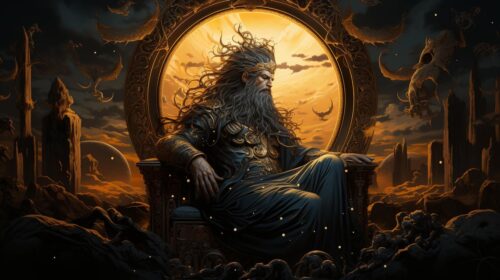Nanna, also known as Sin or Suen, is the Mesopotamian god of the moon. His origins trace back to ancient Sumer, where he was one of the earliest gods worshipped, with his cult persisting well into the 3rd century CE.
Nanna was the son of Enlil, the air god, and Ninlil, the grain goddess, making him one of the most powerful gods in Mesopotamia.
His consort was Ningal, a goddess associated with reeds, reflecting the agricultural base of their worship. Together, they brought several important deities into the universe, including Utu, Inanna, and Ereshkigal.

Symbolism
Nanna was symbolized by the crescent moon, which not only represented his celestial domain but also his influence over the cycles of time and agriculture.
Nanna’s influence was profound, affecting both the religious and daily lives of the Mesopotamian people. He guards his followers against the dangers of the night and guides them through the cycles of life and death. Humans seek his wisdom in matters of divination and justice. As Annunaki, he is a judge of both gods and humans.
Featuring myths
- The Descent of Nanna to the Underworld
- The Marriage of Nanna and Ningal
- The Epic of Gilgamesh
- The Lament for Sumer and Ur
Appearances in modern works
- “Gods, Demons and Symbols of Ancient Mesopotamia: An Illustrated Dictionary” by Jeremy Black and Anthony Green: This dictionary provides details on Nanna and other deities, symbols, and concepts from Mesopotamian beliefs.
- “Inanna, Queen of Heaven and Earth: Her Stories and Hymns from Sumer” by Diane Wolkstein and Samuel Noah Kramer: This collection of translated texts includes references to Nanna in the context of Inanna’s mythology.
Video Games
